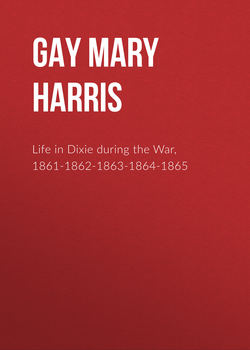Читать книгу Life in Dixie during the War, 1861-1862-1863-1864-1865 - Gay Mary Ann Harris - Страница 15
CHAPTER XII.
A SCENE IN AN ATLANTA CONFEDERATE HOSPITAL
Оглавление“Well, my boy, our patients are all getting along nicely in the Fair Ground hospital,” was the comforting assurance I gave to Toby, who was my faithful co-worker in all that pertained to the comfort of our soldiers. “Suppose we go to the Empire hospital and see what we can do there.”
“Yes’m, I have always wanted to go there.”
Taking one of the baskets we had brought with us from Decatur, and which contained biscuits, rusk, broiled and fried chicken, ground coffee and blackberry wine, I handed it to him and we wended our way to the hospital. Things were not in as good shape there as at the Fair Ground hospital. I perceived this at a glance, and, upon asking and receiving permission from the superintendent, I soon tidied up things considerably. Toby brought pails of fresh water, and aided in bathing the faces, hands and arms of the convalescing soldiers, while I hunted up the soldier lads who ought to have been at home with their mothers, and bestowed the tender loving service that woman only can give to the sick and suffering.
Entering one of the wards I perceived a youth, or one I took to be a youth, from his slender fragile figure, and his beardless face, lean and swarthy in sickness, but beautiful in its fine texture and the marblelike whiteness of the brow. That he was of French extraction there could be no doubt. Quietly kneeling by the side of his cot, I contemplated his face, his head, his figure – I listened to his breathing, and watched the pulsations of his heart, and knew that his days, yea, his hours were numbered. Taking his hand in mine, I perceived that the little vitality that remained was fast burning up with fever. Putting back the beautiful rings of raven hair that lay in disheveled clusters over his classic head, and partly concealed his white brow, I thought of his mother, and imprinted upon his forehead a kiss for her sake. The deep slumber induced by anodynes was broken by that touch, and a dazed awakening ensued. “Mother,” was his pathetic and only utterance.
“What can I do for you, my dear child?”
There are looks and tones which are never forgotten, and never shall I forget the utter despair in the eyes, lustrous and beautiful enough to look upon the glory of heaven, and the anguish of the voice, musical enough to sing the songs of everlasting bliss, as he said in tremulous tone and broken sentences:
“I want to see a Catholic priest. I have paid several men to go for me. They have gone off and never returned. I have no money with which to pay any one else.”
In silence I listened and wept. At length I said:
“My dear young friend, can you not make confession to ‘our Father which art in Heaven,’ and ask Him for Christ’s sake to absolve you from all sins of which you may think yourself guilty? He will do it without the intervention of a priest, if you will only believe on Him and trust Him. Can you not do this?”
